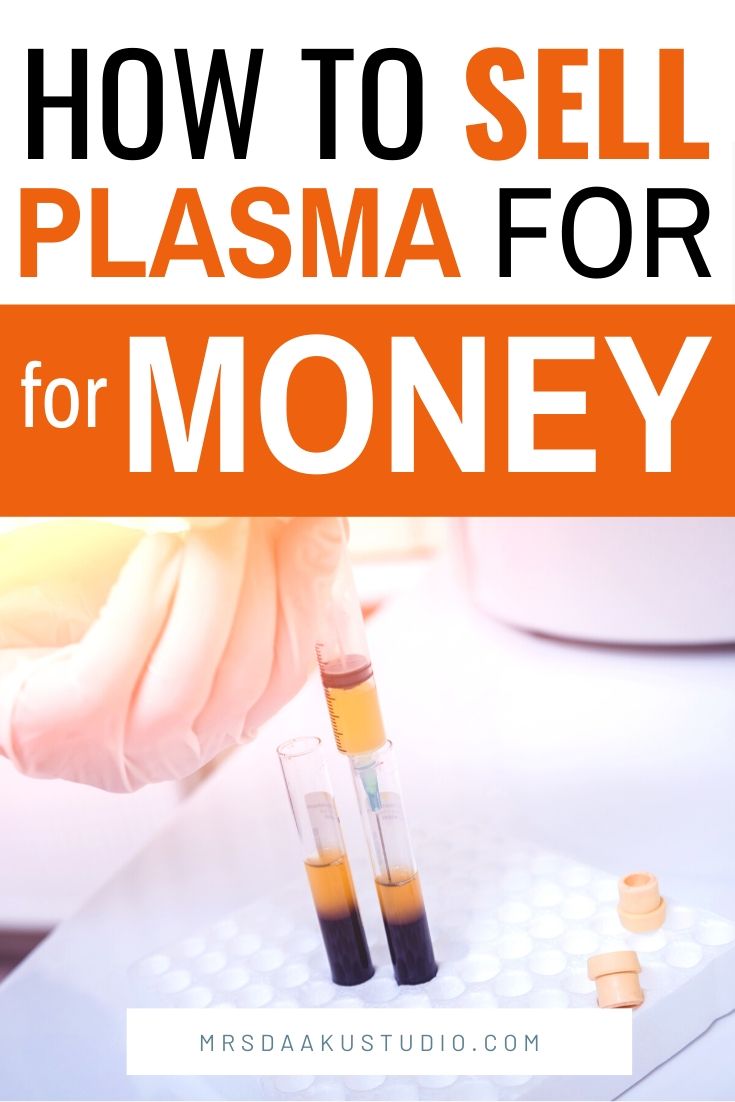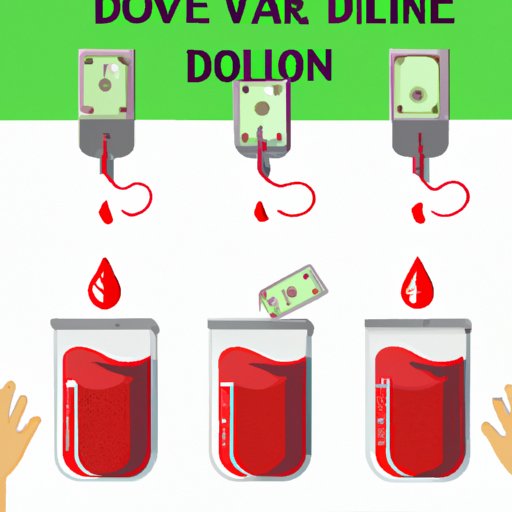What is Plasma Donation and Why is it Valuable?
Plasma donation is a vital process that involves collecting the liquid portion of blood, known as plasma, from donors. This plasma is then used to create life-saving therapies for patients with rare and serious diseases, such as hemophilia and immunodeficiency disorders. The demand for plasma products is growing rapidly, driven by advances in medical research and the increasing need for these therapies.
The plasma donation process typically takes around 1-2 hours, during which time the donor’s blood is drawn and the plasma is separated from the other blood components. The plasma is then frozen and stored for later use. Donors can typically donate plasma twice within a 7-day period, with at least 2 days in between donations.
Plasma donation is a valuable process that not only helps patients in need but also provides an opportunity for donors to earn compensation for their time and effort. Many people are curious about how much they can get paid for selling plasma, and the answer varies depending on several factors, including location, weight, and frequency of donations.
In the United States, plasma donation centers are regulated by the FDA and must adhere to strict guidelines to ensure the safety and quality of the plasma collected. Donors are also screened for various medical conditions and must meet certain eligibility criteria before they can donate.
Overall, plasma donation is a safe and rewarding process that plays a critical role in the development of life-saving therapies. By understanding the importance of plasma donation and the process involved, individuals can make informed decisions about whether or not to become a plasma donor.
How Much Can You Earn from Selling Plasma?
One of the most common questions people have when considering plasma donation is how much they can get paid for selling plasma. The answer varies depending on several factors, including the location of the donation center, the donor’s weight, and the frequency of donations.
On average, plasma donors can earn between $20 to $50 per donation, with some centers offering higher rates for first-time donors or for donors who commit to a certain number of donations within a specific timeframe. The frequency of donations allowed also varies, but most centers allow donors to donate twice within a 7-day period, with at least 2 days in between donations.
Assuming a donor can donate twice a week, the total potential earnings per month can range from $160 to $400. However, this amount can vary significantly depending on the individual’s circumstances and the specific donation center they use.
It’s worth noting that some plasma donation centers offer additional incentives, such as referral bonuses or loyalty programs, which can increase a donor’s earnings. These programs can be a great way for donors to maximize their earnings and make the most of their plasma donation experience.
When considering plasma donation as a way to earn extra money, it’s essential to factor in the time and effort required for each donation. While the payment may not be substantial, the process is relatively quick and easy, and many donors find it to be a rewarding way to contribute to the medical community.
Ultimately, the amount of money a person can earn from selling plasma will depend on their individual circumstances and the specific donation center they use. By understanding the compensation rates and factors that influence them, donors can make informed decisions about whether plasma donation is a worthwhile endeavor for them.
Factors Affecting Plasma Donation Pay Rates
Several factors can influence the amount of money an individual can earn from selling plasma. Understanding these factors can help donors maximize their earnings and make informed decisions about their plasma donation experience.
One of the primary factors affecting plasma donation pay rates is location. Donation centers in urban areas tend to offer higher pay rates than those in rural areas, due to the higher demand for plasma products in these regions. Additionally, some states have laws that regulate the amount of money that can be paid to plasma donors, which can also impact pay rates.
Weight is another factor that can impact plasma donation pay rates. Donors who weigh more tend to have a higher volume of plasma, which can result in higher pay rates. This is because plasma donation centers typically pay donors based on the volume of plasma collected, rather than the number of donations made.
Frequency of donations is also a factor that can impact pay rates. Donors who donate regularly tend to earn more money than those who donate sporadically, as they are able to take advantage of loyalty programs and other incentives offered by donation centers.
Other factors that can impact plasma donation pay rates include the donor’s medical history, the type of plasma being collected, and the specific donation center being used. For example, some donation centers may offer higher pay rates for donors with certain medical conditions, or for donors who are willing to participate in specialized plasma collection programs.
By understanding the factors that affect plasma donation pay rates, donors can make informed decisions about their plasma donation experience and maximize their earnings. Whether you’re looking to earn some extra money or simply want to contribute to the medical community, knowing how to navigate the plasma donation pay system can help you achieve your goals.
When considering how much you can get paid for selling plasma, it’s essential to factor in these various factors and how they may impact your earnings. By doing so, you can make the most of your plasma donation experience and earn the highest possible pay rates.
Top Plasma Donation Centers and Their Pay Rates
There are several plasma donation centers in the US that offer competitive pay rates and incentives to donors. Here are some of the top plasma donation centers and their pay rates:
1. Grifols: Grifols is a leading plasma donation center with locations across the US. They offer a pay rate of $20-$50 per donation, with the opportunity to earn up to $400 per month.
2. BioLife: BioLife is another well-known plasma donation center with locations in the US and Europe. They offer a pay rate of $20-$40 per donation, with the opportunity to earn up to $300 per month.
3. CSL Plasma: CSL Plasma is a global plasma donation center with locations in the US, Europe, and Australia. They offer a pay rate of $20-$50 per donation, with the opportunity to earn up to $400 per month.
4. Octapharma Plasma: Octapharma Plasma is a plasma donation center with locations in the US and Europe. They offer a pay rate of $20-$40 per donation, with the opportunity to earn up to $300 per month.
5. Biotest Plasma: Biotest Plasma is a plasma donation center with locations in the US and Europe. They offer a pay rate of $20-$50 per donation, with the opportunity to earn up to $400 per month.
It’s worth noting that pay rates can vary depending on the location and the specific donation center. Additionally, some donation centers may offer special promotions or bonuses for new donors or for donors who refer friends.
When considering how much you can get paid for selling plasma, it’s essential to research the different plasma donation centers in your area and compare their pay rates and incentives. By doing so, you can make an informed decision about which donation center is right for you and maximize your earnings.
How to Maximize Your Earnings from Plasma Donation
Maximizing earnings from plasma donation requires a combination of strategy and consistency. Here are some tips to help you get the most out of your plasma donation experience:
1. Donate regularly: Donating plasma regularly can help you earn more money in the long run. Most plasma donation centers allow donors to donate twice within a 7-day period, with at least 2 days in between donations.
2. Refer friends: Many plasma donation centers offer referral bonuses for donors who refer friends and family members. These bonuses can range from $10 to $50 per referral, depending on the center.
3. Take advantage of bonus programs: Some plasma donation centers offer bonus programs for donors who reach certain milestones, such as completing a certain number of donations within a specific timeframe.
4. Choose a high-paying center: Research different plasma donation centers in your area and compare their pay rates. Some centers may offer higher pay rates than others, so it’s worth shopping around to find the best deal.
5. Consider donating during peak hours: Some plasma donation centers offer higher pay rates for donations made during peak hours, such as during the morning or afternoon rush.
By following these tips, you can maximize your earnings from plasma donation and make the most of your experience. Remember to always prioritize your health and safety, and to follow the guidelines and regulations set by the plasma donation center.
When considering how much you can get paid for selling plasma, it’s essential to factor in the potential earnings from these strategies. By donating regularly, referring friends, and taking advantage of bonus programs, you can increase your earnings and make plasma donation a worthwhile endeavor.
Plasma Donation Requirements and Eligibility
To be eligible to donate plasma, individuals must meet certain requirements and criteria. These requirements are in place to ensure the safety of both the donor and the recipient of the plasma.
Age: Donors must be at least 18 years old to donate plasma. Some centers may have a maximum age limit, but this varies by center.
Weight: Donors must weigh at least 110 pounds to donate plasma. This is to ensure that the donor has a sufficient amount of blood volume to safely donate plasma.
Medical History: Donors must be in good overall health and free from certain medical conditions, such as HIV, hepatitis, and cancer. Donors must also be free from certain medications, such as blood thinners and immunosuppressants.
Blood Type: Donors of all blood types are eligible to donate plasma, but some centers may have a greater need for certain blood types.
Other Requirements: Donors must also meet other requirements, such as being a resident of the United States, having a valid government-issued ID, and being able to provide proof of address.
Eligibility Criteria: Donors must also meet certain eligibility criteria, such as not having donated plasma in the past 2 days, not having donated whole blood in the past 56 days, and not being pregnant or breastfeeding.
By understanding the requirements and eligibility criteria for plasma donation, individuals can determine if they are eligible to donate and make an informed decision about their plasma donation experience.
When considering how much you can get paid for selling plasma, it’s essential to factor in the eligibility criteria and requirements for plasma donation. By meeting these requirements, individuals can ensure a safe and successful plasma donation experience.
Common Questions About Plasma Donation and Pay
Plasma donation can be a confusing process, especially for those who are new to it. Here are some common questions and concerns about plasma donation and pay:
Q: How often can I donate plasma?
A: The frequency of plasma donation varies depending on the center and the individual’s eligibility. Typically, donors can donate plasma twice within a 7-day period, with at least 2 days in between donations.
Q: Do I need to have a certain blood type to donate?
A: No, donors of all blood types are eligible to donate plasma. However, some centers may have a greater need for certain blood types.
Q: How much does it hurt to donate plasma?
A: Donating plasma is a relatively painless process. Some donors may experience a slight pinch or discomfort during the donation process, but this is usually minimal.
Q: Can I donate plasma if I have a tattoo?
A: Yes, donors with tattoos are eligible to donate plasma. However, some centers may have specific guidelines or restrictions for donors with recent tattoos.
Q: How long does it take to donate plasma?
A: The plasma donation process typically takes around 1-2 hours, depending on the center and the individual’s eligibility.
By addressing these common questions and concerns, individuals can gain a better understanding of the plasma donation process and make an informed decision about their plasma donation experience.
When considering how much you can get paid for selling plasma, it’s essential to factor in the frequency of donations, eligibility criteria, and other factors that can impact the amount of money an individual can earn from selling plasma.
Conclusion: Is Selling Plasma Worth It?
In conclusion, selling plasma can be a worthwhile endeavor for individuals who are eligible to donate and are looking to earn some extra money. With the growing demand for plasma products, there are many opportunities to donate and earn a decent income.
However, it’s essential to consider the benefits and drawbacks of plasma donation before making a decision. While plasma donation can be a lucrative way to earn money, it’s crucial to prioritize one’s health and safety above all else.
By understanding the plasma donation process, the compensation rates, and the factors that influence pay rates, individuals can make an informed decision about whether selling plasma is right for them.
Ultimately, the decision to sell plasma depends on individual circumstances and priorities. If you’re considering plasma donation as a way to earn extra money, it’s essential to weigh the pros and cons and make an informed decision.
When considering how much you can get paid for selling plasma, it’s essential to factor in the benefits and drawbacks of plasma donation. By doing so, you can make a decision that aligns with your financial goals and priorities.
In summary, selling plasma can be a worthwhile endeavor for those who are eligible to donate and are looking to earn some extra money. However, it’s crucial to prioritize one’s health and safety above all else and to make an informed decision about whether plasma donation is right for you.







